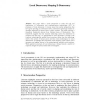Free Online Productivity Tools
i2Speak
i2Symbol
i2OCR
iTex2Img
iWeb2Print
iWeb2Shot
i2Type
iPdf2Split
iPdf2Merge
i2Bopomofo
i2Arabic
i2Style
i2Image
i2PDF
iLatex2Rtf
Sci2ools
108
Voted
EGOV
2003
Springer
2003
Springer
Local Democracy Shaping e-Democracy
This paper offers a fresh perspective to study the role and implications of information and communications technologies (ICT) in processes of local democracy. It moves away from earlier perspectives that have given privilege to information flows, information technology features or strategies employed by human actors in their accounts. The paper proposes a theoretical framework, derived from Giddens theory of Structuration. This framework suggests that the material technology cannot be understood in isolation from the way it is appropriated in social processes. It brings to the forefront technologically enabled social practices rather than the technology itself or the actions of human actors and thus avoids technological or social determinism. It highlights the importance of the interplay of the context, social structures and agency factors in the technologically enabled social practices. When applied to processes of local democracy, it brings forward a number of important insights for ...
EGOV 2003 | Human Actors | Local Democracy | Social |
| Added | 06 Jul 2010 |
| Updated | 06 Jul 2010 |
| Type | Conference |
| Year | 2003 |
| Where | EGOV |
| Authors | Zahid Parvez |
Comments (0)

